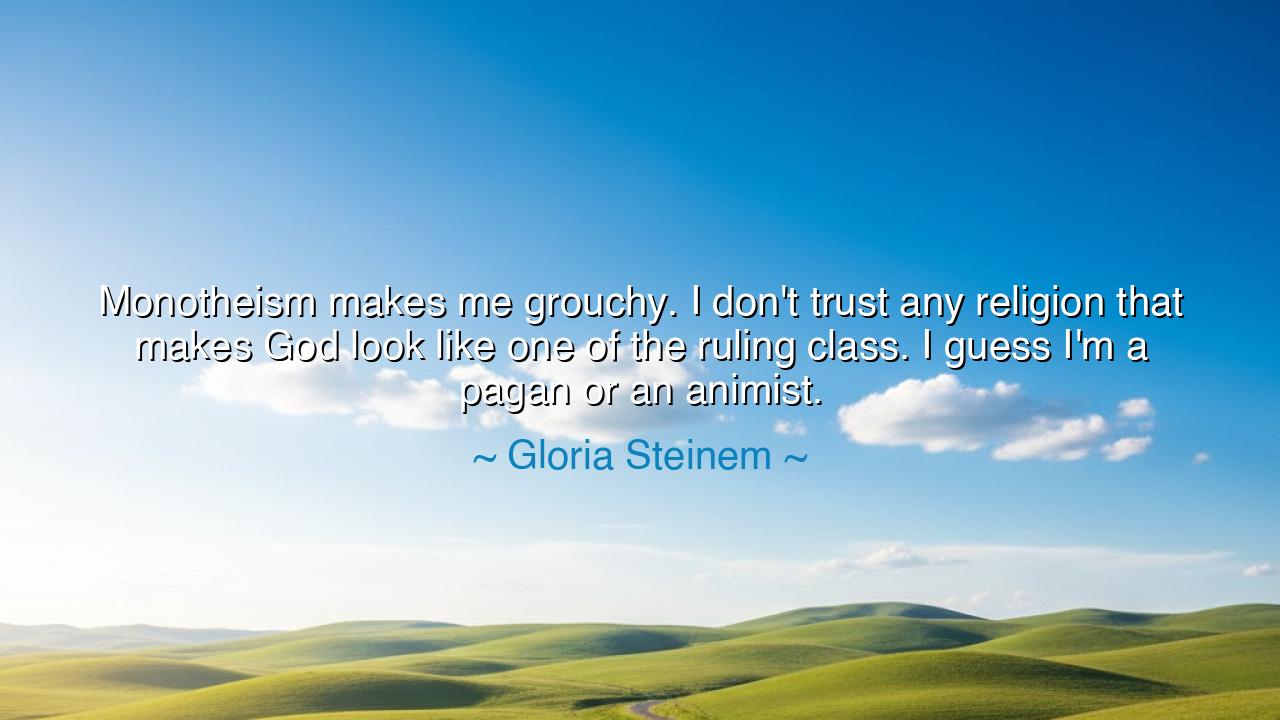
Monotheism makes me grouchy. I don't trust any religion that
Monotheism makes me grouchy. I don't trust any religion that makes God look like one of the ruling class. I guess I'm a pagan or an animist.






"Monotheism makes me grouchy. I don't trust any religion that makes God look like one of the ruling class. I guess I'm a pagan or an animist." – Gloria Steinem.
In these bold and evocative words, Gloria Steinem challenges the very structure of monotheistic religions that often depict God as an entity mirroring the powerful rulers and authoritarian figures of the world. Her frustration lies in the way many monotheistic traditions, especially those stemming from the Abrahamic religions—Judaism, Christianity, and Islam—present a divine being that mirrors the hierarchies of power, where God becomes a distant, ruling figure, imposing laws and control. Steinem’s statement reflects a deeper desire to reconnect with a more personal, egalitarian, and nature-based view of the divine, one where God is not above us, but rather connected to us and the world around us in a more intimate and democratic way.
The ancients were no strangers to different conceptions of the divine, and many cultures embraced a polytheistic or animistic worldview that saw divinity in all aspects of life. For the Greeks, Romans, and other ancient civilizations, gods were not always distant rulers, but personifications of natural forces and human experiences. Zeus, Apollo, Athena, and countless other gods were as much a part of human life as the elements, the earth, and the sea. These gods were deeply tied to the everyday world and were often depicted with human-like qualities, full of strength, flaws, and emotions. The divine was not something entirely separate from the human condition, but something that shared in the struggles, joys, and sorrows of the world. This view of the divine was less about control and more about an interconnectedness with the forces of nature and life.
Similarly, paganism and animism, philosophies that Steinem alludes to in her quote, embrace a view of the divine that is imbued in everything. To the animists, spirits are found not only in human beings but in the earth, the trees, the animals, and the elements. The sacred is not separated from the world—it is woven into its very fabric. The spirits and forces that govern nature are seen as co-equal with humanity, sharing the world rather than ruling over it. This worldview rejects the top-down authority of a distant god-king and instead fosters a sense of shared responsibility with the natural world, where humankind is part of the grand cycle of life.
Steinem’s critique of monotheism as making God look like a member of the ruling class is grounded in her rejection of hierarchical systems—systems that place individuals in positions of absolute power over others. In this, she echoes the sentiments of Frederick Douglass, the great abolitionist, who also criticized the way Christianity was used to justify the enslavement and oppression of African people. Douglass famously said, "I love the pure, peaceable, and impartial Christianity of Christ; I therefore hate the corrupt, slaveholding, women-whipping, cradle-plundering, partial and hypocritical Christianity of this land." Like Steinem, Douglass saw the perversion of religious principles that were used to justify systems of power and inequality, instead of fostering justice and equality.
The ancient concept of theocracy—where a god was often seen as the supreme ruler and even became the justification for political control—was prevalent in many ancient cultures. The Egyptians, for example, viewed their pharaohs as gods on earth, merging the sacred with the temporal. Similarly, the Divine Right of Kings in medieval Europe held that monarchs ruled by divine decree, with their authority being derived directly from God. This was a political system that blended religious authority with political power, often at the cost of freedom and justice. For Steinem, these ideologies of control, justified by an authoritarian god, are exactly what she resists in the modern world.
In the wisdom of Steinem’s words, there is an invitation to reclaim a more earth-centered, egalitarian view of the divine—one that is not confined by rigid hierarchies or the powerful elite but instead nurtures a connection with the natural world and with each other. God, in this sense, is not a figure to be feared or obeyed through rigid rules but a presence that is alive in every leaf, every wind, and every heart. By embracing this more personal, inclusive, and humble view of the divine, we can foster a greater sense of interconnectedness and shared responsibility.
The lesson here is that true spirituality, true connection with the divine, comes not from obedience to an external, authoritarian force, but through understanding, compassion, and equality. Just as the ancients viewed their gods as part of the world’s natural fabric, so should we approach spirituality—as a force of unity, not division, as a force that draws us closer to each other and to the world around us. By rejecting the systems of oppression often tied to religious and political power, we can embrace a more authentic, humble, and empowering form of spirituality—one that is rooted in love, respect, and deep interconnection. Let us look beyond the rules and instead seek a relationship with the divine that unites us all in peace and harmony.






AAdministratorAdministrator
Welcome, honored guests. Please leave a comment, we will respond soon